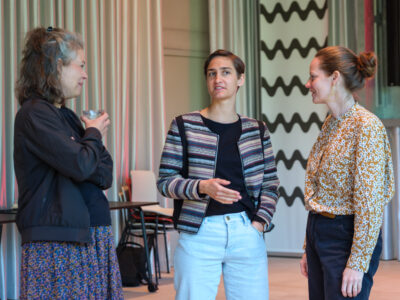Meet the Residents: interface
In each newsletter issue, we present an organisation that works at Publix. This time: Luisa Seeling, Lead Writing, Editing & Publishing at interface.

What is the core of your work?
interface is an independent think tank focused on technology and digital policy. Our experts analyze the political issues emerging from new technologies and provide recommendations for policymakers. Currently, we are working on topics such as artificial intelligence, platform regulation, cybersecurity, state surveillance, and sustainability in semiconductor production. Initially, our focus was largely on Germany, but we are increasingly working on a European level, particularly because crucial regulations such as the AI Act and the Digital Services Act come from Brussels.
What do you aim to achieve?
We are a non-profit organization (formerly named “Stiftung Neue Verantwortung”) that values independent research. Our mission is to equip decision-makers – and, when necessary, the public – with knowledge and arguments to enable better tech policy. By “better,” we mean: effective policies that prioritize the interests of citizens. This means mitigating risks without stifling innovation. Striking this balance is a continuous challenge.
What causes you headaches?
After the active regulatory phase of recent years, we are now seeing signals of a political counter-movement in Europe. I hope the pendulum doesn’t swing too far in the opposite direction. Additionally, I hope the understandable – and often justified – desire to give security agencies more powers in uncertain times does not lead to a weakening of fundamental rights.
What do you contribute to a plural media landscape?
While we are not a journalistic medium, as a think tank we engage with the digital infrastructure that is essential for independent and free journalism. Our experts, for example, work on platform regulation, data protection, protection against cyberattacks, and safeguarding minors online – all of which are foundational for quality journalism to thrive.
Who or what deserves more attention?
The environmental and climate aspects of technology. Many people use AI systems like ChatGPT, but often forget that this is a luxury. Even seemingly trivial queries consume enormous amounts of energy, and the generation of that energy has a significant environmental impact.
A good read for understanding the current situation?
At interface, we read a lot of specialized newsletters. I personally follow Tech and Brussels newsletters from “Politico”, the “Tagesspiegel Background Digitalisierung”, and the SZ-Dossier “Digitalwende” – all are great for an overview. Our experts read a wide range of broader and more specialized newsletters, with a few favorites including: “Tech Policy Press”, “MIT Technology Review”, “Wired Newsletter”, “Cyber & Cognitive Conflict Compass” (4C), “Rest of World Global”, Martin Husovec’s DSA Newsletter, “Risky Business” or “Blood in the Machine”.
What should people be listening to right now?
In our latest interface newsletter, our colleagues recommended some excellent podcasts: “A Sense of Rebellion”, which tells the forgotten story of a secret tech lab from the 1960s; “Levittown”, about the origins of the deepfake phenomenon; and “Wind of Change”, which explores the question of whether the Scorpions’ iconic hit was actually written by the CIA.
What do you wish for the Publix Initiative?
I hope that the momentum and spirit of its beginnings are maintained! And that we try to take divergent – even radically different – opinions seriously, as long as they remain within the framework of the Basic Law, and that we do not prematurely narrow the scope of the conversation. I believe Publix can play a significant role as a platform in this regard.
More about interface


